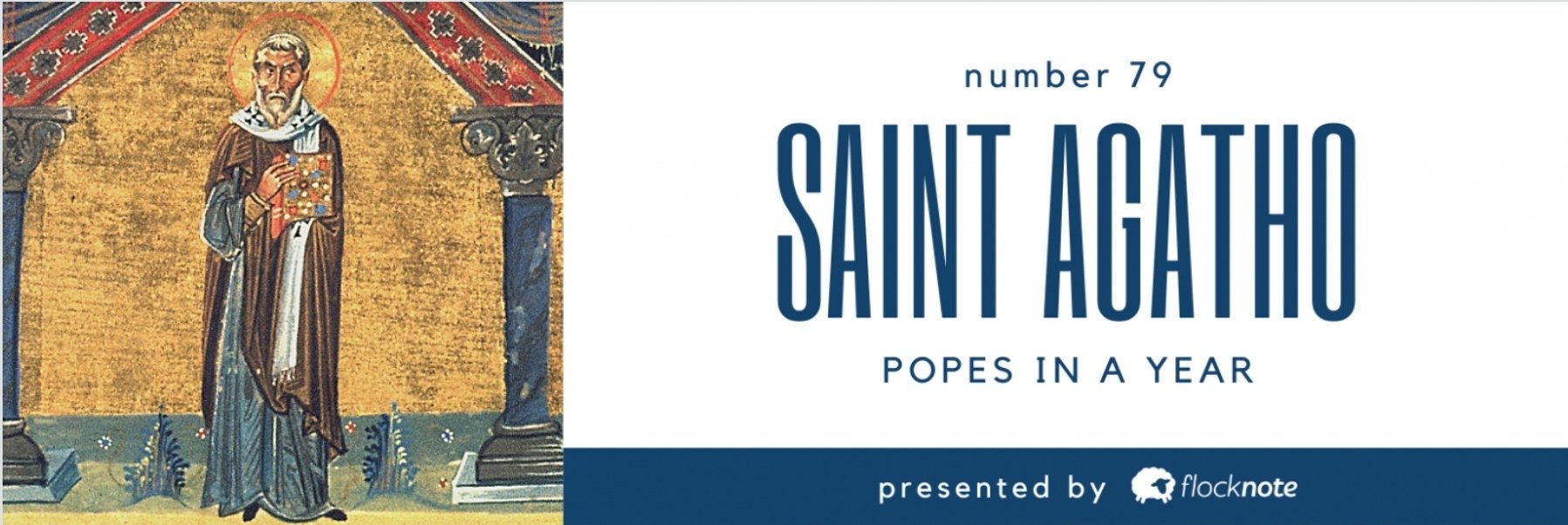
Died: January 10, 681 A.D.
Pronounced: EGG-uh-thoe
Give me the scoop on Agatho.
A Sicilian by birth, Agatho was a Benedictine monk prior to being pope. He was gifted in business, and as a result served as the Church’s treasurer for a time. Having been born sometime before the year 600, Agatho was advanced in years (some even say he was over 100 years old) by the time of his election on June 27, 678.
Agatho was known as a kindly man with a heart for charity. He helped resolve a kerfuffle in England when the archbishop of York, St. Wilfrid, had his diocese split into three parts by St. Theodore, the archbishop of Canterbury and head honcho of the English Church. Keeping true to the Church’s principle of subsidiarity, Agatho made sure not to go over Theodore’s head, but was eventually able to make Wilfrid happy. Agatho died in Rome on January 10, 681. He’s recognized as a saint in both the Eastern Orthodox and Catholic churches.
What was he known for?
St. Agatho’s greatest accomplishment was, by far, organizing and convening what became the Sixth Ecumenical Council of the Church, held at Constantinople in the year 680. Just prior to Pope Donus’ death, the emperor had sent the pope a letter seeking reunion between the East and West on the heresy of Monothelitism, which held that Christ had just one will, not two. Agatho was, apparently, himself pretty jacked about the idea of a new ecumenical council.
Though the council itself was summoned in 678, Agatho delayed its start to write the other Western bishops, asking them to convene regional councils and consider their positions regarding the heresy. Once Agatho heard back, he composed a profession of faith that spoke for the Church in the West, then sent three representatives to Constantinople to preside over the council. The Council Fathers, over 170 bishops in total, gave Agatho’s document two thumbs way up and approved it completely. Though the pope died before the “acts of the council” could get back to Rome, the council remained the crown jewel of his papacy and cemented his reputation as a good and holy pope. If you’ve got a full cup of coffee and 15 minutes to spare, you can read Agatho’s letter to the emperor here.
“Woe is me if I neglect to preach the truth of my Lord, which [past popes] have sincerely preached. Woe is me if I cover over with silence the truth which I am bidden to give.”
– Pope St. Agatho
Fun Fact…
Many miracles were reported and attributed to St. Agatho after his death in 681. As a result, he was given by many the nickname Thaumaturgus, or “Wonderworker.”
What else was going on in the world at the time?
In 679, Emperor Constantine IV signed a peace treaty with Muawiyah I, leader of the Islamic army. The treaty was to last 30 years and stipulated that Muawiyah pay annually 3,000 pounds of gold, 50 horses, and 50 slaves, in addition to removing Muslim garrisons on the Byzantine coast.
Coming tomorrow….Pope St. Leo II
Can’t get enough papal history?
Click here to listen to The Popecast, a short podcast about popes from the author of Popes in a Year.
SOURCES (and further reading)
John, E. (1964). The Popes: A concise biographical history. New York: Hawthorn Books.
Pope St. Agatho – http://www.newadvent.org/cathen/01204c.htm
Pope Agatho – https://en.wikipedia.org/wiki/Pope_Agatho
670s – https://en.wikipedia.org/wiki/670s
Sent by Matthew Sewell